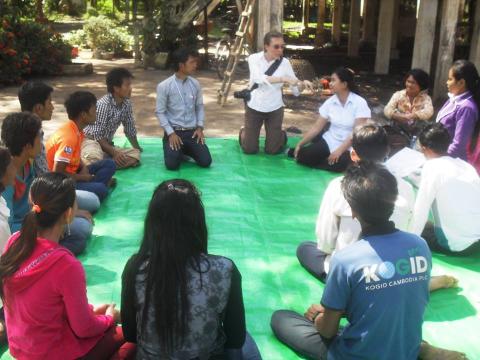
Slowly motorcycle by motorcycle they begin to arrive and take a seat on the tarp spread out on the heat-baked ground. A group of men sharing the latest news of the town drifts over to see what they are missing. A number of young Buddhist monks, just returning from their morning rounds of offering blessings and accepting food as alms from believers, trickle over. Slowly, the tarp fills up with people who are instructed to sit in a semi-circle with the deaf family members sitting up front. What is it they have come to see?
The deaf instructors begin using Cambodian Sign Language and other gestures to communicate and teach the signs for various words. More importantly, they make an effort to understand the signs created by each individual – some used for 20, 30, or even 60 years of life to communicate with the wider world.
While good statistics are not available, each year, our outreach teams will identify more than 100 deaf adults who previously had little to no access to services for personal development. Most have had little opportunity for education, employment or exposure to conversation outside their families. While many families develop their own sign language to communicate and include their deaf family members, some do not.
For some of the deaf participants, they have never had an opportunity to interact with other deaf people. If they attended school, they were left to copy off the notes of a neighbor and decipher the meaning on their own. When our field workers arrive, they flip the status quo. The previously ignored community members are suddenly the most important people in the town. The field workers are a living example of bringing about the Kingdom of God, for which we wait during this season of Advent.
Our staff often say one of the greatest challenges the fear that many of the deaf people feel when they find themselves at the center of positive attention. The staff work to do what today's reading from Isaiah says: "Strengthen the hands that are feeble, make firm the knees that are weak, say to those whose hearts are frightened: Be strong, fear not!" Slowly, with practice, encouragement, and a supportive community of peers, the confidence of our deaf students grows. These new students will join a community where they can understand all that is being said and be understood in return. The once timid will develop the language, support, and confidence to defend their rights and thrive in this world.
One of our staff members, Oudom, often shares the story of when he first came to DDP. He was shy. He could not remember the signs or make the hand gestures correctly but, every night, by the light of a candle, because he had no electricity, he would study his sign language books and copy the hand shapes until his hands became strong.
The second reading for today, from James, says "See how the farmer waits for the precious fruit of the earth, being patient with it until it receives the early and the late rains. You too must be patient." Oudom had to exercise this patience and still must exercise it today because deaf people are often disrespected and excluded from everyday life in Cambodia. Just as he practiced his signs every night, he, along with his fellow community members must slowly advocate for Cambodia to be a society where all are equal and valued.
During my work at the Deaf Development Programme, I often think it is not the members of the deaf community that need to have their ears unclogged but rather those of us who would refuse to recognize the dignity of our deaf brothers and sisters. We are all created in the image and likeness of God. We should respect the variety and diversity of the God's creation. We need to open our blind eyes and stand in solidarity with our deaf community members as they advocate for their rights to education in their language, employment, healthcare and respect for their culture.
In the Gospel of Matthew today, Jesus said, "Go and tell John what you hear and see: the blind regain their sight, the lame walk, lepers are cleansed, the deaf hear..." May we each come to the understanding that the minority groups we so often marginalize are not the ones in need of healing for the Kingdom to come here on earth. It is those of us in the majority that need to be healed so we may learn to welcome the many images of God.
Photo: Karen Bortvedt (wearing white shirt and camera), a Maryknoll Lay Missioner, instructs a group of deaf students at the Deaf Development Programme in Cambodia. Photo courtesy of Karen Bortvedt.
